|
|
|
Sort Order |
|
|
|
Items / Page
|
|
|
|
|
|
|
| Srl | Item |
| 1 |
ID:
102112
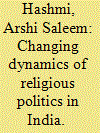

|
|
|
| 2 |
ID:
131459
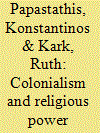

|
|
|
|
|
| Publication |
2014.
|
| Summary/Abstract |
This article critically assesses the conflict within the Orthodox Church of Jerusalem between the Greek hierarchy and the Arab laity concerning the proposals of the Mandatory Government for a new regulatory framework for patriarchal operation. The British presented two draft reform ordinances, neither of which met Arab expectations. Instead of promoting the laity's emancipation from 'foreign' Greek administrative and financial control, the ordinances left little room for a true inversion of the power structure between the two opposing camps, retaining the status quo at the expense of the Arab Orthodox rights.
|
|
|
|
|
|
|
|
|
|
|
|
|
|
|
|
| 3 |
ID:
106697
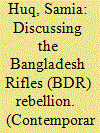

|
|
|
|
|
| Publication |
2011.
|
| Summary/Abstract |
This article explores the piety/politics nexus by asking what it means when educated, urban Bangladeshi women who are embracing religion anew claim that their pursuit of piety, and the learning circles that inspire it, are apolitical. I explain this self-proclaimed apolitical stance through women's own accounts of why and how they maintain political neutrality. The article demonstrates that organizers of many Islamic discussion circles in Dhaka consciously strive to attain a certain political neutrality, while allowing whoever is interested to attend, irrespective of the latter's political affinities. This decision stems from an understanding of the lack of trust that accompanies organized religion in Bangladesh, and its alliance, in the national imaginary, with the explicit political agenda of the Jama'at-i Islami. The article provides an account of different discussion circle members' varied articulation of political neutrality and how they draw from different ideas and discourses about being publicly religious in their molding of the ideal, pious, Bangladeshi woman. To exemplify the pious self-fashioning of urban, educated, Bangladeshi women, I will recount the ways in which several women discussed the March 2009 Bangladesh Rifles mutiny-a highly politically charged event. Women's accounts of the mutiny serve to unify lesson attendees around the cultivation of piety. Contestations over national politics and political affinities are made secondary, as women focus on giving an ethical bend to the deeply personal, subjective and gendered experiences of being educated and upwardly-mobile in present day urban Bangladesh.
|
|
|
|
|
|
|
|
|
|
|
|
|
|
|
|
| 4 |
ID:
155720
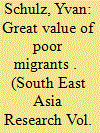

|
|
|
|
|
| Summary/Abstract |
Unskilled migrant workers and their families represent a crucial human resource in Sabah (Malaysia) as cheap labour, but also as religious believers. Christian organizations belonging to various denominations have started to cater to this community in recent years by providing educational services. Based on an ethnography of two schools led by charismatic South Korean missionaries and patronized by a Lutheran church with roots in Sabah, this article argues that ‘salvation’, as it is understood and practiced through education in these institutions, falls short of empowering migrants as a whole and rather contributes to reproducing their subordination as a community within Sabahan society.
|
|
|
|
|
|
|
|
|
|
|
|
|
|
|
|
| 5 |
ID:
125025
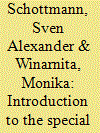

|
|
|
|
|
| Publication |
2013.
|
| Summary/Abstract |
The second half of the twentieth century witnessed the rise of what might arguably be described as political religion, with faith traditions everywhere experiencing parallels to the rise of Hindutva in India or the 'muscular' and virulently anti-minority political Buddhism of Sri Lanka and Myanmar. Similarly, Israel, a country founded by cosmopolitan, social-democratic nineteenth century perceptions of Jewish 'national' identity, is increasingly struggling with its ostensibly secular founding ethos. Religiously conservative political parties and attitudes have become mainstreamed in Israel's political landscape in the last couple of decades.1 What might help account for these seemingly similar developments, all of which appear to contradict the basic dictum of secularization theory, namely that increasingly prosperous, urban and industrialized societies will relegate religion and religious practices to the private sphere of a personal 'faith'? Until recently, the assumption persisted that the historical experience of Western Europe, the first part of the world to undergo industrialization and the wider sociocultural effects associated with the process of 'secularization', would be replicated as other parts of the world modernized. An important debate has ensued over the past 20 years or so, involving scholars representing a wide range of disciplinary backgrounds over what appears to be the revitalization of religion and even possibly processes of de-secularization.
|
|
|
|
|
|
|
|
|
|
|
|
|
|
|
|
| 6 |
ID:
060624
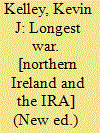

|
|
|
|
|
| Edition |
New ed.
|
| Publication |
London, Zed Books Limited, 1988.
|
| Description |
xvii, 395p.Pbk
|
| Standard Number |
0862327652
|
|
|
|
|
|
|
|
|
|
|
|
Copies: C:1/I:0,R:0,Q:0
Circulation
| Accession# | Call# | Current Location | Status | Policy | Location |
| 032152 | 941.60824/KEL 032152 | Main | On Shelf | General | |
|
|
|
|
| 7 |
ID:
132311
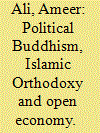

|
|
|
|
|
| Publication |
2014.
|
| Summary/Abstract |
After nearly a millennium of uninterrupted harmony between the Sinhalese and Muslims in Sri Lanka, economic and ethno-religious developments after the 1970s have created an atmosphere of communal tension between the two groups. While a new wave of political Buddhism with its militant offshoot amongst the Sinhalese and the growth of a rigid Islamic orthodoxy amongst the Muslims have provided the ethno-religious dimension to this tension, the post-1977 open economy has added an economic dimension to it. The interplay of this toxic triad is a reminder of a similar scenario that produced the first Sinhalese-Muslim racial riots in the country in 1915. Unlike the first, which occurred in the colonial context, the current one, which if not arrested, will not only jeopardize Sinhalese-Muslim harmony but also will result in adverse consequences in Sri Lanka's relations with Muslim countries.
|
|
|
|
|
|
|
|
|
|
|
|
|
|
|
|
| 8 |
ID:
127437
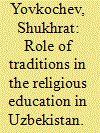

|
|
|
| 9 |
ID:
115075
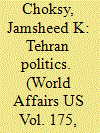

|
|
|
|
|
| Publication |
2012.
|
| Summary/Abstract |
You are not a wise man, you tyrant," raps the Iranian female singer Bahar. "Why do your clothes smell like blood??.?.?.?Why do you crush this cry for justice? The people don't deserve such disdain." Her chiding words against Supreme Leader Ayatollah Ali Khamenei go to the heart of the problem that the Islamic Republic faces: the growing illegitimacy of a cruel and inaccessible theocracy whose control over Iran might well be slipping.
|
|
|
|
|
|
|
|
|
|
|
|
|
|
|
|
| 10 |
ID:
086096
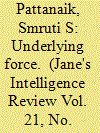

|
|
|
| 11 |
ID:
114681
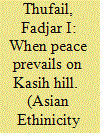

|
|
|
|
|
| Publication |
2012.
|
| Summary/Abstract |
Proliferating conflicts in the Moluccas, Kalimantan, and Central Sulawesi marked an increasing interest in ethnic politics in post-1998 Indonesia. At the same time, the establishment of the National Adat Alliance (AMAN) in 2003 ushered in a new era of ethnic awareness among the customary law (adat) communities in Indonesia. In order to resolve the religious and ethnic conflicts as well as communal tensions, the central government enacted a Joint Decree that stipulated the creation of the Forum for Religious Harmony (FKUB). In North Sulawesi, however, neither the Protestant Church (GMIM) nor the Minahasan adat community has strongly supported the FKUB. On the one hand, the GMIM wanted to have a conflict resolution and conflict prevention strategy that appeared less 'religious' and in so doing the GMIM decided to work closely with a social network called JAJAK. On the other hand, the adat community perceived the proliferating conflicts as detrimental to their struggle for an ethnic recognition. Forging an alliance with the GMIM was impossible due to the history of violent relationship between the church and the adat leaders. The adat activists eventually created the Minahasan Adat Council (MAM). This essay argues that ethnic politics in post-1998 North Sulawesi have been confronted with strong resistance from religious authorities; however, at the same time, religion was able to capitalize on an emerging interest in ethnic movements on the national level.
|
|
|
|
|
|
|
|
|
|
|
|
|
|
|
|
|
|
|
|
|